This Woman Is Staging Ukraine’s Most Daring Rescue Operations
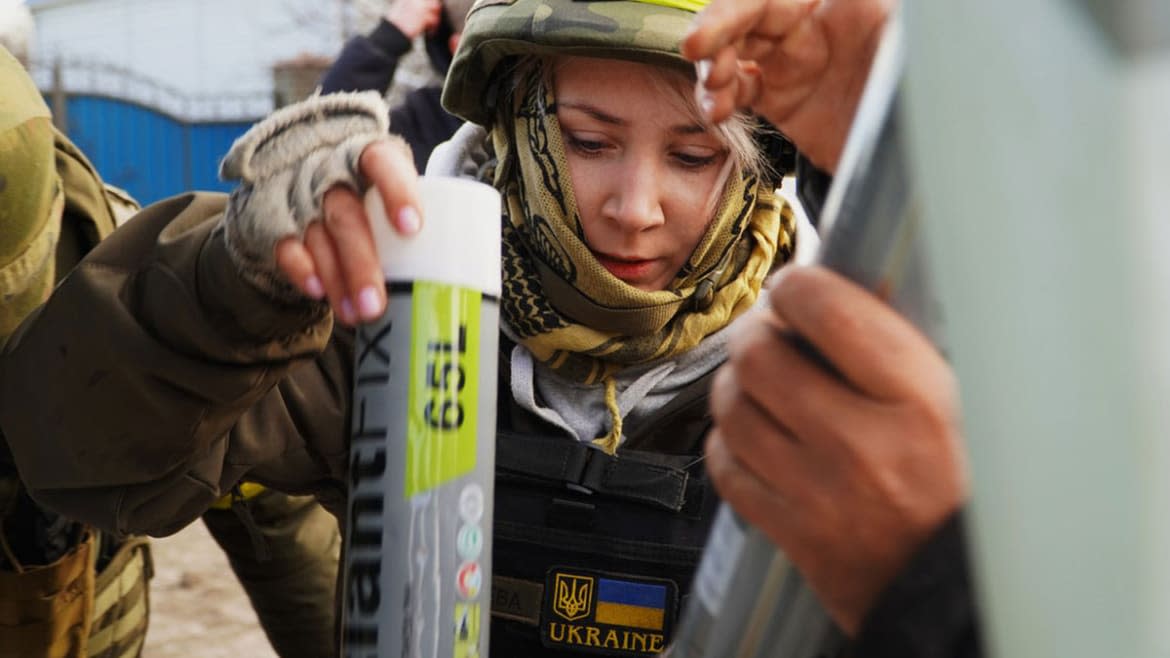
MAKIIVKA, Ukraine—A few miles from the frontvline of the brutal war in Ukraine, Olga Zaitsova, 31, turns to us in the back of the car to remind everyone that this mission is about precision and speed. The longer the evacuation takes, the higher the risk that the Russians will attack before we can liberate a badly injured 79-year-old man.
The Russian positions are only 900 yards from the village of Makiivka in the Luhansk region. The car drives along bumpy roads without much cover towards the village, which has been the site of relentless fighting, while Zaitsova listens—with her window down—for signs that violence will take hold once again.
Zaitsova, who covers her blonde hair under a scarf and the safety of a battle helmet, leaves her smiling and cheerful attitude behind as we move deep into the war zone. She is one of the only people brave—or foolhardy—enough to carry out evacuation operations this close to the front line, and she knows that there is no room for mistakes.
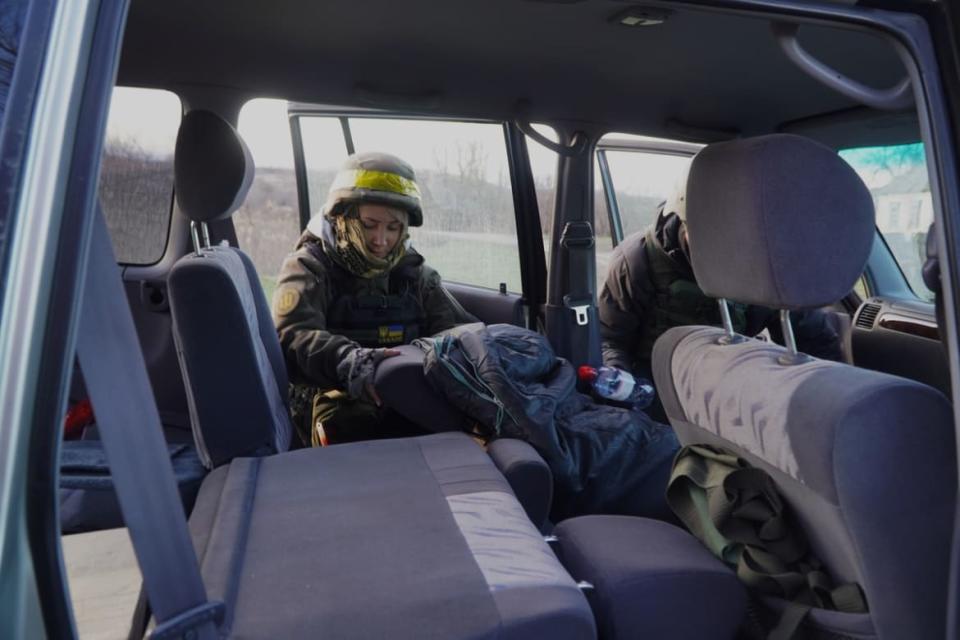
Zaitsova has been doing this job for months. She always drives with the window down to listen to early signs of danger.
Almost all of the buildings we pass are destroyed. In Makiivka, the car must navigate past rubble, bricks, and holes left by artillery fire. The Russians tried to attack the city the day before, and the Ukrainian army is continuing to try and repel them in further skirmishes.
“After Makiivka is another village—Novovodino. It is occupied. It is under Russia. It is very close,” says Zaitsova while the car passes the remains of a blown-up school, which has been reduced to rubble like most houses in the village where only a very few civilians remain.
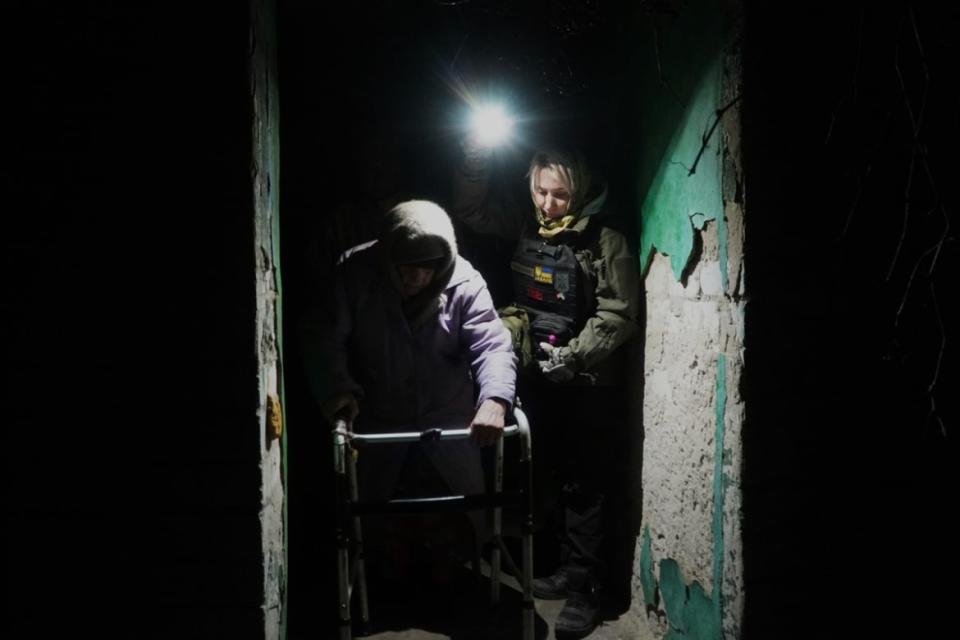
It gets dark early in Ukraine now, and fighting tends to be more severe at night. Here Zaitsova is helping 80-year-old Lida out of the house.
It is mostly quiet as the team moves towards Nikolai Sharikov’s house to rescue him. His 19-year-old grandson has joined the evacuation team in order to convince his reluctant grandfather that now was the time to leave his home.
As they park the two evacuation cars, a Ukrainian soldier approaches from a concealed position and warns that they have spotted a Russian drone and that they might soon attack.
“You have five minutes,” he says.
It is still relatively quiet, but Zaitsova knows from experience that you cannot let your guard down and be fooled by a moment of calm. She has been on so many of these missions when hell suddenly breaks loose. There could be only a few seconds between hearing the hiss of a grenade and your life being over.
The Ruse That Could Dupe Putin Into Another Crushing Ambush
The Ukrainian army regained control of Makiivka just three weeks ago after eight months of Russian rule. When Zaitsova first visited the city on the day it was liberated, her team was chased by Russian artillery fire which exploded right and left around the car.
Zaitsova has an 11-year-old son at home. She is not here for the fireworks.
The team moves quickly into the house, where the man is lying in his bed. He has a broken hip and a damaged shoulder and needs to get to a hospital. He is barely able to walk.
While he is getting dressed and ready to move, the distant sound of what appears to be two Russian artillery rounds explode somewhere. A warning that things might soon pick up. Team members look for places to take cover while they get Sharikov out of the house.
Now Ukrainian soldiers are returning fire with mortar grenades. The pressure wave slaps us in the face.
Go! Go! Go!
Zaitsova puts down one of the car seats so Sharikov can lie down. Five minutes have already passed, and it’s time to get out of there.
The cars leave the house in a hurry but the injured man feels a jolt of pain every time the car hits a bump. We roll towards the center again and out of the village on the dusty and frosted roads.
Soon, we are out of the village but the danger isn’t over. The route on the way back goes along the frontline villages, and the team needs to rescue more people who are trapped.
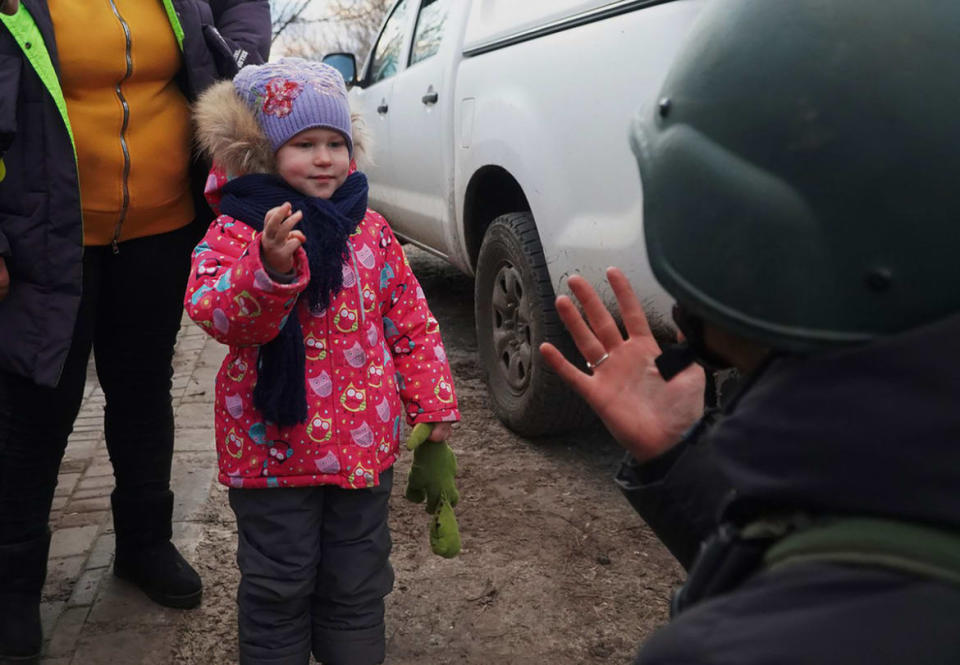
The team says that getting children out is the best part of the job.
“This is not a job for us—we do not receive any money. This is volunteering,” says Zaitsova, whose team consists of herself, another Ukrainian, and a British national from Cornwall named Chris Parry. The 27-year-old software engineer traveled to Ukraine in March after seeing the brutality of the Russian invasion. After some basic training by a volunteer military group near Kyiv, he started helping with evacuations near the front line.
Zaitsova has formed her own charitable foundation, Elefond, which allows people to donate and fund these expeditions.
“I have been volunteering since day one. In 2014, I helped the military a little, but it was a completely different war,” says Zaitsova, referring to the Russian invasion of Eastern Ukraine, “And now, since the first days of the war, I have been here at the front.”
Zaitsova suddenly stops talking. She can hear something in the air and needs to quickly decide if we need to stop and take cover. Fortunately, this one doesn’t come our way.
“Sorry about that, but I have to listen all the time… the main thing is not to panic and always be alert. But, of course, it can be scary. We all run, we all duck, we all hide, like any military man would be able to tell you.”
Compulsion
Before the Russian invasion, Zaitsova had a normal civilian life as an auditor. Her 11-year-old son doesn’t enjoy his mom being in constant, mortal danger and wants her home more. Zaitsova feels she can’t just sit quietly while her country is on fire, however. She says she feels an obligation to help the people that she meets every day. The people who are desperate to escape this hell.
Zaitsova has a reputation for being one of the bravest rescuers in Ukraine. She goes where few others dare to go. So far, her team has been able to evacuate 45 people from Makiivka. They have also been to many other frontline cities and always coordinate with the Ukrainian military.
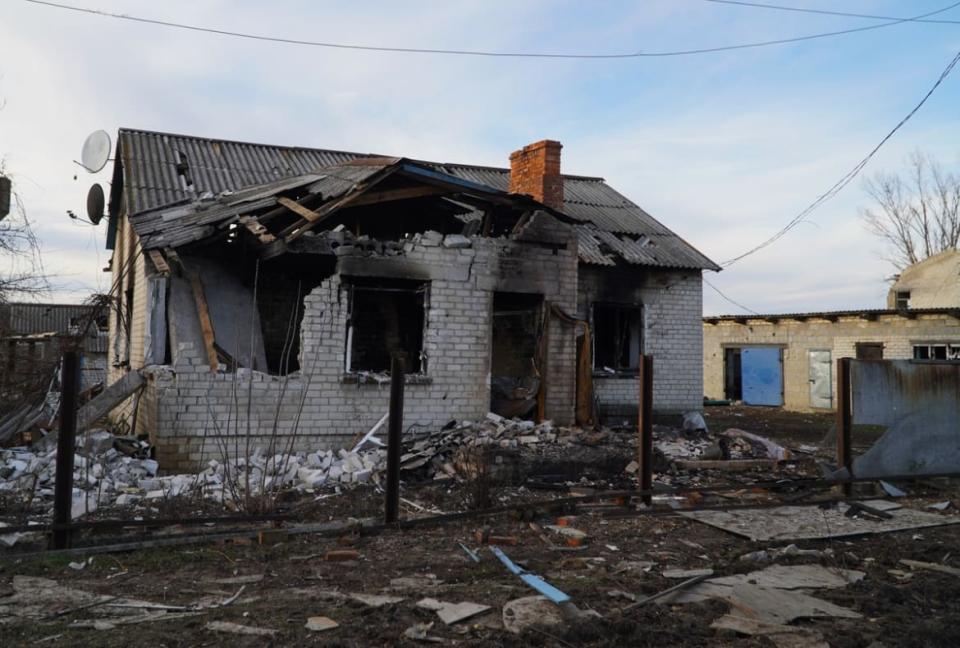
Destruction is everywhere in Makiivka.
“My son says: ‘Mom, you are a great person,’ but he wants me to be home more, I can’t always do that. It is a luxury for me to be home because many people here need to be taken out while there is still time,” says Zaitsova, “My child misses me, and I miss him too.”
“But we call each other. Every time I go out, I always call him or write. And when I leave the danger zone again, I also call him,” says Zaitsova.
“I was here on day one when Makiivka was liberated, and all people here were offered to evacuate. There were wild firefights here, ongoing battles… We were lucky today,” she says.
Putin Is Preparing to Flee When Russia Implodes, Ex-Aide Says
More than anything, Zaitsova just wants to return to life before the Russian invasion.
“Why did this war start at all? Why did Russia decide to invade on the 24th of February and bombard all of Ukraine? That is the question.”
In Nevs’ke, the team pulls up to a small cottage. A 25-year-old mother waits with her daughter, aged 3, who is wearing a pink jacket decorated with owls. Like Makiivka, Nevs’ke was under Russian control for eight months and is now part of the front line. During the Russian occupation, they all had to hide in the basement.
Chris, the British national, asks the girl how old she is. He shows four fingers, and she responds with three. The rest of the family is also there, but they don’t want to leave. Like many remaining people, they are hesitant to leave their houses and few belongings. Many would rather risk their lives than move to an uncertain future where they don’t know what will come next.
Everyone is packed into the car as darkness starts to descend.
“The Russians are about three kilometers away now, roughly speaking—something like this. However, mortar grenades can still reach. They can usually fire five to six kilometers,” Zaitsova says.
It is dark when the team reaches Zarichne where Lida, 80, is waiting. Zaitsova and Lida’s friends are helping her get ready. Lida pushes her walker slowly towards the car.
In Sloviansk, about 20 miles from the front line, Lida, the mother, and child are dropped off at a refugee shelter while Sharikov is driven to a hospital.
In the shelter, Lida sits exhausted on a bench, taking a breath of relief.
“Thank you, thank you. Thank you to all of you,” she says, “Thank you.”
Get the Daily Beast's biggest scoops and scandals delivered right to your inbox. Sign up now.
Stay informed and gain unlimited access to the Daily Beast's unmatched reporting. Subscribe now.

